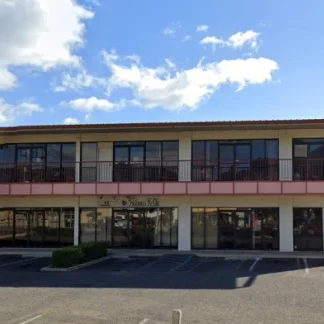Waianae Coast Comprehensive Health Center - Recovery Services
Waianae Coast Comprehensive Health Center – Recovery Services is a private rehab...
Hoomau Ke Ola (HKO) is a cultural healing addiction treatment center located in Waianae, HI. Dedicated to community restoration, the center focuses on substance abuse and related disorders, enriched by the island's indigenous insights.
Hoomau Ke Ola’s continuum of care includes the following:
The residential treatment program provides a safe, stable, serene, and distraction-free environment. During their stay, residents participate in both Western best practice curricula, such as cognitive behavioral intervention (CBI), and cultural curriculum, such as kūkulu kumuhana (statement of purpose). Residential treatment integrates evidence-based therapies with cultural practices, fostering a comprehensive recovery.
For those needing a more structured yet non-residential program, the intensive outpatient program (IOP) offers deeper therapeutic interventions. For 4-8 weeks, the IOP provides individual and group counseling, case management, and addiction care coordination.
Understanding the need for flexibility and continued care, HKO’s outpatient treatment allows clients to receive treatment and return home each day. The program offers a mix of group, individual, and family therapies tailored to individual needs.
This program offers a structured living environment where individuals can practice the skills and insights garnered during treatment. With an emphasis on community, responsibility, and self-reliance.
Empowering clients beyond therapy, HKO integrates vocational and employment education. This initiative equips individuals with the skills and confidence to re-enter the workforce and rebuild their lives.
Recovery is an ongoing journey. HKO’s aftercare and alumni support ensures that individuals remain connected, supported, and equipped to maintain their sobriety in the long run.
Contact us for more information: (808) 696-4266

Connect with Hoomau Ke Ola by calling their admissions team directly.
(808) 696-4266 Website Get DirectionsResearch clearly demonstrates that recovery is far more successful and sustainable when loved ones like family members participate in rehab and substance abuse treatment. Genetic factors may be at play when it comes to drug and alcohol addiction, as well as mental health issues. Family dynamics often play a critical role in addiction triggers, and if properly educated, family members can be a strong source of support when it comes to rehabilitation.
Group therapy is any therapeutic work that happens in a group (not one-on-one). There are a number of different group therapy modalities, including support groups, experiential therapy, psycho-education, and more. Group therapy involves treatment as well as processing interaction between group members.
Trauma therapy addresses traumatic incidents from a client's past that are likely affecting their present-day experience. Trauma is often one of the primary triggers and potential causes of addiction, and can stem from child sexual abuse, domestic violence, having a parent with a mental illness, losing one or both parents at a young age, teenage or adult sexual assault, or any number of other factors. The purpose of trauma therapy is to allow a patient to process trauma and move through and past it, with the help of trained and compassionate mental health professionals.
Group therapy is any therapeutic work that happens in a group (not one-on-one). There are a number of different group therapy modalities, including support groups, experiential therapy, psycho-education, and more. Group therapy involves treatment as well as processing interaction between group members.
Trauma therapy addresses traumatic incidents from a client's past that are likely affecting their present-day experience. Trauma is often one of the primary triggers and potential causes of addiction, and can stem from child sexual abuse, domestic violence, having a parent with a mental illness, losing one or both parents at a young age, teenage or adult sexual assault, or any number of other factors. The purpose of trauma therapy is to allow a patient to process trauma and move through and past it, with the help of trained and compassionate mental health professionals.
Trauma therapy addresses traumatic incidents from a client's past that are likely affecting their present-day experience. Trauma is often one of the primary triggers and potential causes of addiction, and can stem from child sexual abuse, domestic violence, having a parent with a mental illness, losing one or both parents at a young age, teenage or adult sexual assault, or any number of other factors. The purpose of trauma therapy is to allow a patient to process trauma and move through and past it, with the help of trained and compassionate mental health professionals.
Waianae Coast Comprehensive Health Center – Recovery Services is a private rehab...
Hina Mauka Teen Care provides quality substance abuse services to adolescents. H...
YMCA of Honolulu - Nanakuli High & Intermediate School provides after-school...
YMCA of Honolulu - Waianae Intermediate School provides after-school programs an...